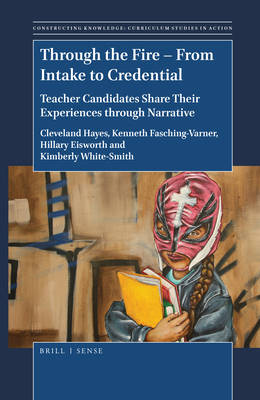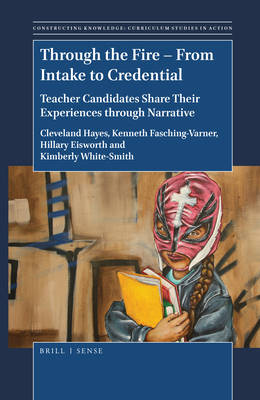
- Retrait gratuit dans votre magasin Club
- 7.000.000 titres dans notre catalogue
- Payer en toute sécurité
- Toujours un magasin près de chez vous
- Retrait gratuit dans votre magasin Club
- 7.000.0000 titres dans notre catalogue
- Payer en toute sécurité
- Toujours un magasin près de chez vous
Through the Fire - From Intake to Credential
Teacher Candidates Share Their Experiences Through Narrative
Cleveland Hayes, Kenneth J Fasching-Varner, Hillary B Eisworth, Kimberly White-Smith
183,45 €
+ 366 points
Format
Description
By applying an auto-ethnographic approach in this volume to share and explore the experiences of prospective teachers as they navigate the preparation and credentialing processes of teacher education, we - as those who have gone before the future educators in this text and those who will come behind them, gain first hand insights from these young women and men about what it means and how to better prepare prospective educators to become a teacher against a backdrop of historical inequities in schooling and prepared for the multi-culturally diverse classrooms of today. Teacher educators, school and community leaders, and others committed to pushing toward more equitable social domains and forms of living and learning hence would do well to take up the opportunity provided in this text to learn from the narratives included in this volume and those of other teacher candidates; indeed, the narratives of teacher candidates herein and elsewhere are, in part, reflections of ourselves as teacher educators and evaluations of our work in teacher education and the professional preparation of those who will carry on our professions after us and for rising generations. What we as teacher educators teach, or think we are teaching, in teacher preparation courses may, or may not, be what prospective teachers are learning about being a teacher and successful teaching and learning for all learners, particularly those students historically underserved.
Each of the prospective educators who share their narratives in this volume are striving to become critical educators capable of promoting equitable educational and social opportunities, outcomes, and experiences for all learners. While their journeys are each distinctive and unique to them personally, the teacher candidates who share their narratives in this volume highlight some of the challenges and opportunities they have encountered in teacher preparation courses to learn about the functioning of social structures that sustain society's existing hierarchies and develop the skills and knowledge requisite to identify, implement, and assess critical learning strategies aimed at challenging inequities and promoting more inclusive forms of education. Specifically, these future teachers included in this volume are sharing with us, their readers, their attempts at learning to unhook from Whiteness and to disrupt the pernicious and historical school-to-prison pipeline that has long existed in the US between the nation's prison system and schools serving learners and their families and communities identified as racially not White, economically poor, and otherwise not members of the White, middle-class, primary English speaking, heterosexual, patriarchal mainstream.
Each of the prospective educators who share their narratives in this volume are striving to become critical educators capable of promoting equitable educational and social opportunities, outcomes, and experiences for all learners. While their journeys are each distinctive and unique to them personally, the teacher candidates who share their narratives in this volume highlight some of the challenges and opportunities they have encountered in teacher preparation courses to learn about the functioning of social structures that sustain society's existing hierarchies and develop the skills and knowledge requisite to identify, implement, and assess critical learning strategies aimed at challenging inequities and promoting more inclusive forms of education. Specifically, these future teachers included in this volume are sharing with us, their readers, their attempts at learning to unhook from Whiteness and to disrupt the pernicious and historical school-to-prison pipeline that has long existed in the US between the nation's prison system and schools serving learners and their families and communities identified as racially not White, economically poor, and otherwise not members of the White, middle-class, primary English speaking, heterosexual, patriarchal mainstream.
Spécifications
Parties prenantes
- Auteur(s) :
- Editeur:
Contenu
- Nombre de pages :
- 204
- Langue:
- Anglais
- Collection :
- Tome:
- n° 18
Caractéristiques
- EAN:
- 9789004388185
- Date de parution :
- 20-09-18
- Format:
- Livre relié
- Format numérique:
- Genaaid
- Dimensions :
- 160 mm x 236 mm
- Poids :
- 430 g

Les avis
Nous publions uniquement les avis qui respectent les conditions requises. Consultez nos conditions pour les avis.






